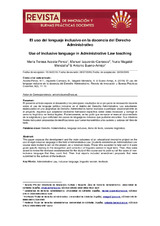El uso del lenguaje inclusivo en la docencia del Derecho Administrativo
Use of inclusive language in Administrative Law teaching
Autor
Acosta Penco, Teresa
Izquierdo-Carrasco, Manuel
Magaldi Mendaña, Nuria
Bueno Armijo, Antonio
Editor
UCOPressFecha
2019Materia
Derecho AdministrativoLenguaje inclusivo
Libros de texto
Sexismo lingüístico
Administrative Law
Inclusive language
Linguistic sexism
Textbook
METS:
Mostrar el registro METSPREMIS:
Mostrar el registro PREMISMetadatos
Mostrar el registro completo del ítemResumen
El presente artículo expone el desarrollo y los principales resultados de un proyecto de innovación docente sobre el uso de lenguaje jurídico inclusivo en el ámbito del Derecho Administrativo. Los estudiantes matriculados en una asignatura de Derecho Administrativo fueron invitados a participar voluntariamente en el proyecto. Aquellos que aceptaron recibieron formación específica sobre cómo reconocer y corregir el sexismo lingüístico en textos legales. Posteriormente, se les pidió que revisaran el manual recomendado de la asignatura y que señalaran los casos de lenguaje no inclusivo que pudieran encontrar. Sus informes finales incluyeron propuestas de modificaciones que fueron transmitidos a los autores y autoras del libro de texto. This paper exposes the development and the main outcomes of an educational innovative project on the use of legal inclusive language in the field of Administrative Law. Students enrolled in an Administrative Law course were invited to join on the project, on a voluntary basis. Those who accepted to take part in it were given specific training in the recognition and correction of linguistic sexism in legal texts. Then, they were asked to review the textbook recommended for the study of the course and to point out all the cases of non-inclusive language that they could find. Their final reports included amendment proposals that were submitted to the authors of the textbook.

